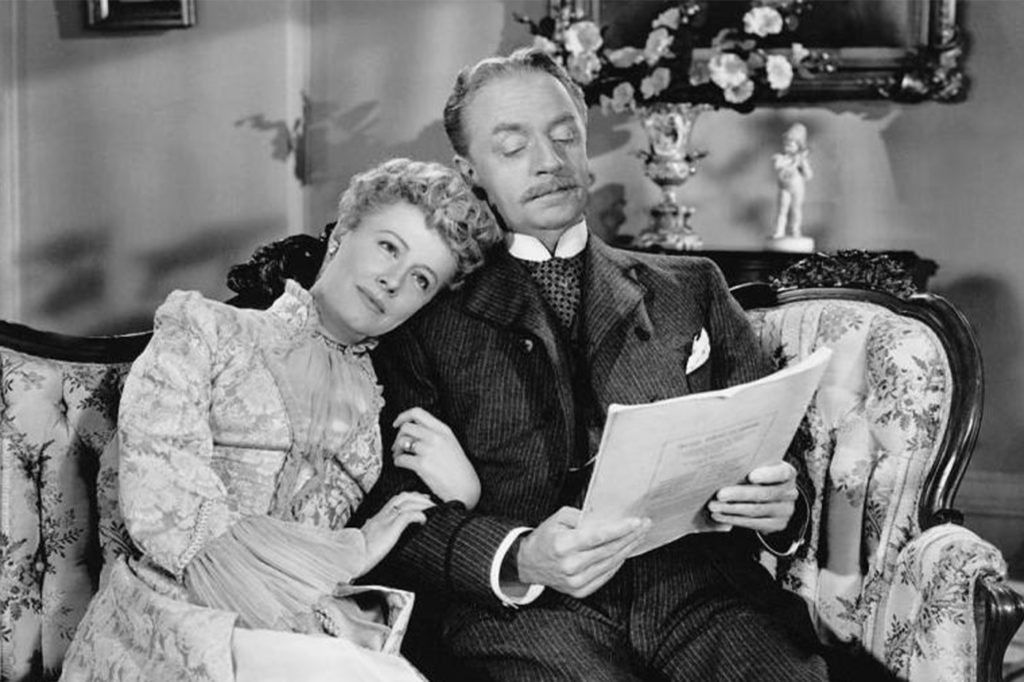To discover more excellent reads and cinema selections, don’t miss our Isolation Bookshelf collection.
Dads never get a break. Or at least so you might conclude from their depiction in movies, in which they are often put upon, led around by the nose by their wives and children, and generally made figures of fun. Moms get somewhat better treatment in film, but perhaps that is because maternal love and self-sacrifice tug at our heartstrings so much more effectively. Solid, stolid fathers, on the other hand? They get the pratfalls.
This weekend is the second Father’s Day since my dad passed away, and both his virtues and his foibles have led me to think about the best depictions of fathers in classic films. Turner Classic Movies will devote the day to dad films, and several that I would recommend will be shown there. Our Vines Have Tender Grapes (1945), with Edward G. Robinson as a Norwegian immigrant farmer in Wisconsin, is a fine example. Robinson’s Martinius Jacobson is all kindness and care, the kind of father who cares about his child’s upbringing above all other considerations. Life With Father (1947), played more for laughs, gives us William Powell as Clarence Day, the benevolent tyrant of his household, who is all bluster, bellowing, and bellyaching, but who in truth would move heaven and earth (and even bend his knees) for the sake of his family. And Father of the Bride (1950) stars Spencer Tracy as the title character, worrying his way frantically and hilariously through the wedding plans—and the bills—generated by his daughter Elizabeth Taylor and his wife Joan Bennett.
TCM will also be showing A Family Affair (1937), the first of the “Hardy family” movies, which developed into a hugely popular series. That first picture starred Lionel Barrymore as the patriarch Judge Hardy, but when it was a smash hit and a sequel was called for, the part was played by the dadliest of all movie dads, Lewis Stone, from the second film onward (You’re Only Young Once, 1937). In every entry in the series, Judge Hardy and son Andy (Mickey Rooney) had to have a “man to man talk” about some pickle the boy was in, and the father’s advice was invariably wise.
Start your day with Public Discourse
Sign up and get our daily essays sent straight to your inbox.Like Judge Hardy, sometimes great fathers are just supporting players in someone else’s story. And I mean supporting, because these fathers could be called upon to prop up their kids even when they were making choices dad might not have made. The fine character actor Donald Crisp excelled at this kind of role, in films like How Green Was My Valley (1941) and National Velvet (1945). Leon Ames, in Meet Me in St. Louis (1944), was the sort of father who could be counted on in a pinch to make sacrifices for his family. Paul Dooley brought paternity to new heights of loving exasperation as the father of the obsessive bicycle racer Dennis Christopher in Breaking Away (1979). And who cannot love William Demarest as the police officer in The Miracle of Morgan’s Creek (1943), calmly but ominously cleaning his pistol on his front porch while his daughter’s suitor gives an account of his intentions?
Fathers bear all kinds of burdens, and the best of them do so with quiet determination. In The Best Years of Our Lives (1946), three fathers exemplify this: Fredric March, as the dad come home from war whose daughter falls for a married veteran; Roman Bohnen, in one affecting scene where he learns of his son’s heroism on bombing missions; and Walter Baldwin, as the father of a sailor who has lost both his hands. And the other landmark film from that same year, It’s a Wonderful Life, can be seen as the story of a son who comes, however reluctantly, to model his whole life on that of his father, and to see the worth of his steady, uncomplaining contribution to their community.
Gregory Peck, it seems, was born to play fathers. In 1962 alone he played two memorable ones, both lawyers in the South. In Cape Fear, he is Sam Bowden, whose family is threatened by an ex-con he sent to prison, and who finds the inner resources to do whatever it takes to protect them. And in To Kill a Mockingbird, he is the almost unbelievably noble Atticus Finch, a widower capably raising two young children, who takes up the defense of a black man accused of raping a white woman.
Fatherhood under stress can bring out amazing reserves of tenacity. James Stewart is tested by the kidnapping of his son in Alfred Hitchcock’s The Man Who Knew Too Much (1956). The scene where Stewart’s character, a doctor, drugs his anxious wife (Doris Day), may not sit too well with contemporary viewers, however.
Ending on a lighter note, I’ll recommend two films in which fathers go to humorous lengths to give their families more creature comforts. In Mr. Blandings Builds His Dream House (1948), Cary Grant suffers a series of indignities and outrageous costs to move his wife (Myrna Loy) and their two daughters from a cramped New York apartment to a new home in the Connecticut countryside. And in Our Man in Havana (1959), Alec Guinness, a humble vacuum cleaner salesman, gets involved in the Cold War spy game in order to ensure that his daughter can maintain her lifestyle as a country club equestrienne. Not long after this film was made, Fidel Castro took over Cuba.
As I said, dads never get a break.














